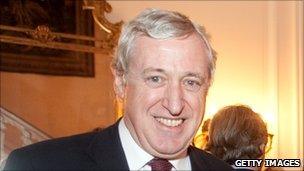France gets plum job in new EU diplomatic service
- Published

Ambassador Vimont's diplomatic career spans more than 30 years
France's ambassador to the US, Pierre Vimont, has been appointed secretary-general of the EU's new diplomatic service - the most senior post under EU foreign policy chief Baroness Ashton.
EU foreign ministers have approved the structure and funding of the European External Action Service (EEAS), which is expected to be launched in December.
The EEAS, set up under the Lisbon Treaty, is aimed at giving the EU a bigger, more united voice globally.
The EEAS will have up to 7,000 staff.
The new service will include officials seconded from national diplomatic services as well as from the European Commission and the Council of Ministers - the body representing the 27 member states' governments.
The Commission's Director-General for Trade, Irish career diplomat David O'Sullivan, will become EEAS Chief Operating Officer. In a high-flying diplomatic career, he served previously as head of cabinet for former Commission President Romano Prodi.
Baroness Ashton served previously as EU Trade Commissioner, but has little high-level foreign policy experience, so her appointment to the prestigious new post nearly a year ago surprised many observers. She is also a vice-president of the Commission.
'Brightest and best'
Announcing the appointments on Monday, she said Pierre Vimont "is held in the highest regard by the diplomatic community and will bring a wealth of knowledge and expertise on foreign policy issues".
"David [O'Sullivan] has served in the highest capacity in the European Commission, as well as having a diplomatic background.
"I promised to appoint the brightest and best and... I have done just that," she said. "In their respective roles they will help to create a European diplomatic service that the people of Europe can be proud of."
Mr Vimont was France's top diplomat in Brussels for four years, including during the French six-month presidency of the EU in 2000.
He will oversee policy, with Mr O'Sullivan overseeing the budget and staff administration.
Critics say the EEAS threatens to duplicate the work of member states' embassies around the world, costing extra taxpayers' money.
But many politicians across the EU say the 27-nation bloc needs to project diplomatic muscle globally to match its economic strength, especially as China and India are now major competitors.
- Published29 July 2010